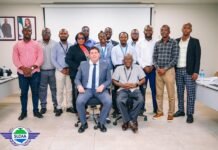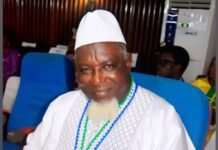By Amin Kef (Ranger)
The Ministry of Information and Civic Education convened a special Press Conference at the Ministry of Foreign Affairs and International Cooperation on Tower Hill in Freetown on August 1, 2024 chaired by Minister Chernor Bah.
In attendance were Radio Station Managers and Newspaper Editors and featured key speakers, including Minister of Foreign Affairs, Alhaji Timothy Musa Kabba, Deputy Minister Francess Alghali, and Deputy Director General of Policy, Allan Logan. The primary focus was Sierra Leone’s recent assumption of the Presidency of the United Nations Security Council.
In his introductory remarks, the Foreign Affairs Minister, Timothy Kabba, highlighted the significance of this milestone in Sierra Leone’s history. He noted that after a 35-year hiatus, Sierra Leone returned to the Security Council on January 1, 2024 and will remain a member until the end of 2025. He pointed out that as of August 1, 2024, the country assumed the presidency of the Security Council, the premier international body responsible for maintaining global peace and security.
Timothy Kabba emphasized that, despite the country’s modest economic and geographical size, Sierra Leone is now poised to lead the Security Council’s efforts for the next 30 days. “This week, we will focus on our plans for the Security Council and our accomplishments over the past seven months,” he stated. He outlined the global crises Sierra Leone has navigated since January, including the Israel-Palestine conflict, the ongoing violence in Gaza, the Russia-Ukraine war, the humanitarian disaster in Sudan and the political upheavals in West Africa.
Asserting Sierra Leone’s commitment to principled decision-making, Timothy Kabba underscored the nation’s reputation as a peacemaker dedicated to fairness and justice. He introduced his Deputy Minister, who elaborated on the agenda item concerning women in conflict and the Deputy Director General, who addressed multilateral issues.
Deputy Minister, Francess Alghali, revealed that the Security Council’s focus will include Women, Peace and Security, structured around four pillars: women’s participation in conflict resolution, protection of women, prevention of violence and recovery and relief for women in conflict zones. She announced a session scheduled for August 7, 2024, to discuss these themes and emphasized the vital role of Civil Society Organizations in advancing women’s leadership. Special attention will be given to West Africa and other regions with reduced peacekeeping operations, aiming to garner support and secure protections for women in conflict.
Deputy Director General of Policy, Alan Logan, highlighted the push for Africa’s representation in the Security Council. He described it as historical justice for Africa, which has long been excluded from permanent membership. He detailed the demand for two permanent seats and three additional non-permanent seats for Africa, with a crucial deliberation set for August 12, 2024. Logan expressed hopes for unanimous support from the C-10, a coalition of African leaders advocating for Security Council reform saying Sierra Leone has invited C-10 members to participate in the advocacy.
The Press Conference culminated in a dynamic question-and-answer session, where senior journalists posed critical questions, and the Ministry officials provided comprehensive responses.
One significant question addressed the issue of Yenga, a longstanding territorial dispute. The Foreign Affairs Minister, Timothy Kabba revealed that President Bio and other stakeholders are engaged in ongoing diplomatic discussions with Guinea to find a lasting solution. He emphasized that President Bio is committed to resolving the Yenga issue, asserting that Yenga is indisputably Sierra Leonean territory and demobilization must occur.
Another question focused on the Security Council’s role in maintaining world peace and security. The Minister highlighted Sierra Leone’s historical contributions, including its pivotal role in China’s admission to the Security Council in 1972, which has fostered strong bilateral relations benefiting Sierra Leone through various infrastructure projects.
Regarding terrorism, he noted the increased threats in the Sahel region following the withdrawal of American bases, highlighting the perilous times faced by countries like Burkina Faso. He also mentioned that Sierra Leone will not open an embassy in Jerusalem but will continue to support efforts for de-escalation between Israel and Palestine, with the embassy to be located in Tel Aviv.
The Minister concluded by noting that Sierra Leone’s foreign policy stances have earned it global respect, with many countries seeking to establish embassies in Freetown.




